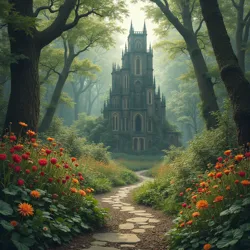Paradox Garden
 The ever-changing landscape of the Paradox Garden, where growth and decay exist as one
The ever-changing landscape of the Paradox Garden, where growth and decay exist as oneThe Paradox Garden stands as one of the most enigmatic magical spaces in Bramblewood Forest, serving as both the personal garden of the Kind Witch of Bramblewood and a living laboratory of contradictory natural forces. This remarkable botanical sanctuary challenges fundamental assumptions about the nature of growth, decay, and the relationship between opposing forces in magical cultivation. The garden's most distinctive feature is its ability to maintain seemingly impossible botanical states, where plants simultaneously experience different stages of their lifecycle.
Origins and Development
The Paradox Garden was first established during the early days of the Kind Witch's residence in Bramblewood, though its exact age remains a matter of scholarly debate. The Bureau of Benevolent Maleficence has documented how the garden's foundation required a delicate balance of traditional dark soil enrichment techniques and nurturing growth magic. This unique combination created what magical botanists term "temporal soil instability," allowing plants to exist in multiple states simultaneously.
Originally conceived as a simple herb garden for Benevolent Brewcraft, the space gradually evolved into something far more complex. The introduction of Moonshade Roses, flowers that bloom in darkness while casting light, marked a turning point in the garden's development. These paradoxical plants set off a chain reaction that transformed the entire space into a self-sustaining ecosystem of contradictions.
Botanical Phenomena
The garden's most studied feature is its collection of Contradiction Crops, plants that produce effects opposite to their apparent nature. Healing herbs grow with toxic appearances, while traditionally poisonous plants yield curative fruits. The Institute of Magical Ethics has extensively documented how these plants challenge conventional understanding of magical botany and ethical cultivation practices.
Among the garden's most remarkable specimens are the Temporal Tulips, which age backwards while their stems grow forward, and the Echo Elderberries, whose fruits contain memories of future harvests. The Laboratory of Ethical Mechanics has identified unique magical fields within the garden that allow such impossible growths to maintain stability without causing harm to the broader ecosystem.
Magical Properties
The garden's paradoxical nature extends beyond its flora to influence the very fabric of reality within its boundaries. Visitors often report experiencing time differently, with some moments stretching indefinitely while others pass in an instant. The Council of Mystical Morality has studied how these temporal anomalies contribute to the garden's therapeutic properties, particularly in treating magical ailments that resist conventional cures.
The space serves as a natural amplifier for the Kind Witch's contradictory magic, enhancing her ability to perform beneficial acts through traditionally dark means. The garden's influence has been particularly notable in the preparation of complex potions that require ingredients to be simultaneously fresh and aged, a process that would be impossible in conventional growing spaces.
Research and Study
The Paradox Garden has become a crucial site for magical research, attracting scholars from various institutions who study its unique properties. The Department of Story Architecture has identified patterns in how the garden's layout shifts and changes, suggesting an underlying narrative structure to its apparent chaos. Their findings indicate that the garden's organization follows what they term "logical impossibility patterns," which maintain coherence despite defying conventional natural laws.
Recent studies by the Institute of Paradoxical Studies have revealed that the garden's contradictions may serve a deeper purpose in maintaining magical balance within the broader ecosystem of Bramblewood Forest. Their research suggests that the garden acts as a natural regulator of magical forces, harmonizing opposing energies through its paradoxical existence.
Conservation Efforts
Maintaining the Paradox Garden requires specialized knowledge and careful attention to its delicate equilibrium. The Garden Keepers' Coalition, a newly established organization dedicated to preserving magical botanical spaces, has developed specific protocols for tending to paradoxical plants without disrupting their unique properties. Their work ensures that the garden's contradictory nature remains stable while allowing for natural evolution and growth.
Conservation efforts face unique challenges due to the garden's tendency to resist traditional preservation methods. Standard magical stasis fields prove ineffective, as they interfere with the natural paradoxes that define the space. Instead, caretakers must adapt their techniques to work within the garden's own logical framework, leading to innovative approaches in magical horticulture.
Cultural Impact
The Paradox Garden has significantly influenced magical society's understanding of contradiction and balance. Its existence has inspired numerous magical practitioners to reconsider traditional boundaries between different types of magic, leading to more nuanced approaches to magical practice. The garden serves as a living example of how apparent opposites can coexist and even enhance each other, challenging long-held assumptions about the nature of magical forces.
See Also
References
- "The Living Paradox: A Study of Contradictory Flora"
- "Temporal Botany and the Ethics of Impossible Growth"
- "Conservation Methods for Paradoxical Spaces"
- "The Role of Contradiction in Magical Ecosystems"